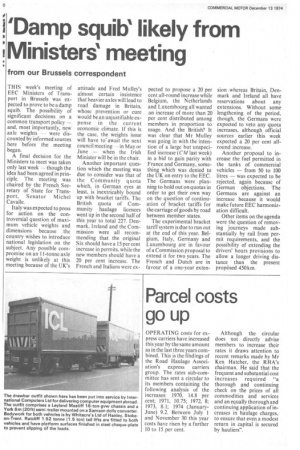'Damp squib' likely from Ministers meeting
Page 12

If you've noticed an error in this article please click here to report it so we can fix it.
from our Brussels correspondent
THIS week's meeting of EEC Ministers of Transport in Brussels was expected to prove to be a damp squib. The possibility of significant decisions on a common transport policy — and, most importantly, new axle weights — were discounted by informed sources here before the meeting began.
A final decision for the Ministers to meet was taken only last week — though the idea had been agreed in principle. The meeting was chaired by the French Secretary of State for Transport, Senator Michel CavaIle.
Italy was expected to press for action on the controversial question of maximum vehicle weights and dimensions because the country wishes to introduce national legislation on the subject. Any possible compromise on an 11-tonne axle weight is unlikely at this meeting because of the UK's attitude and Fred Mulley's almost certain insistence that heavier axles will lead to road damage in Britain, whose prevention or cure would be an unjustifiable expense in the current economic climate. If this is the case, the weights issue will have to await the next council meeting in May or June — when the Irish Minister will be in the chair.
Another important question which the meeting was due to consider was that of the Community quota which, in German eyes at least, is inextricably bound up with bracket tariffs. The British quota of Community haulage licences went up in the second half of this year to total 227. Denmark, Ireland and the Commission were all recommending that the original Six should have a 15 per cent increase in permits, while the new members should have a 20 per cent increase. The French and Italians were ex pected to propose a 20 per cent all-round increase while Belgium, the Netherlands and Luxembourg all wanted an increase of more than 20 per cent distributed among members in proportion to usage. And the British? It was clear that Mr Mulley was going in with the intention of a large but-unspecified increase (CM last week) in a bid to gain parity with France and Germany, something which was denied to the UK on entry to the EEC. The Germans were planning to hold out on quotas in order to get their own way on the question of continuation of bracket tariffs for the carriage of goods by road between member states.
The experimental bracket tariff system is due to run out at the end of this year. Belgium, Italy, Germany and Luxembourg are in favour of a Commission proposal to extend it for two years. The French and Dutch are in favour of a one-year exten sion whereas Britain, Denmark and Ireland all have reservations about any extensions. Without some lengthening of the period, though, the Germans were expected to veto any quota increases, although official sources earlier this week expected a 20 per cent allround increase.
Another proposal to increase the fuel permitted in the tanks of commercial vehicles — from 50 to 100 litres — was expected to be rejected, again because of German objections. The Germans are against an increase because it would make future EEC harmonization difficult.
Other items on the agenda were the question of removing journeys made substantially by rail from permit requirements, and the possibility of extending the drivers' hours provisions to allow a longer driving distance than the present proposed 450 km.




























































































